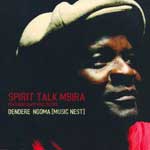The second thing that hits you is how pitch-perfect all the playing and singing is, track after track. This album sounds stronger than much of what has actually come out of Zimbabwean studios in recent years. You would probably not guess that most of the musicians accompanying Dutiro are white Europeans. And it turns out this is a problem for the band. Dutiro’s sleeve notes say that Spirit Talk Mbira is sometimes denied festival gigs because most of the players are not Africans. “The white people in charge,” writes Dutiro, “are segregating the white people in my band. This is the way I grew up in the Rhodesia-apartheid system.” Ow! Well, no worries, the musicianship and mastery of Zimbabwe’s modern traditional idioms here are beyond reproach. Any festival that would deny this band a gig based on nationality or skin color really needs to examine its principles.
Back to the music, these are songs Spirit Talk has been nurturing since it formed 13 years ago. They owe a lot to Zimbabwe’s guitar band heyday in the late 70’s and 80’s. The guitar work on “Zunde (Farming land)” and parts of “Machangwa (Mr. Hunger)” is of a piece with Thomas Mapfumo’s 1983 classic Ndangariro, an album that predates Dutiro’s arrival in Mapfumo’s band. The minor keys, biting tones, and urgent precision of the lines expertly evoke this emotionally charged era, but never feel like an imitation. The band adds subtle polyrhythmic shifts on “Zunde” and richly harmonized waves of male and female vocal on “Machangwa” that underscore Spirit Talk’s freshness, vigor and originality.
Dutiro and his musicians have absorbed styles well enough to recombine and reinvent them with confidence. “Shumba ya Mukwashi (The lion spirit of the hunter)” is a striking, moody mbira song. (It was the basis for the 1984 Mapfumo classic “Kufa Kwangu.”) But here it is rendered as an ambient guitar and bass vehicle, with Dutiro singing softly and sweetly in spare, ringing dream space. “Nzenza (We thank you)” evokes the swinging African jazz sound of Bulawayo in the ‘50s and ‘60s, only with mbira-like guitar driving the harmony—again highly original, and absolutely irresistible. “Huku ine Ronda (Wounded Chicken)” pairs mbira and chiming acoustic and melodious electric guitars, and omits drums in favor of shuffling hosho (shaker)—its a rousing and beautiful adaptation of the mbira song “Shanje.”
The closer “Dendere Ngoma (Music Nest)” peaks out on an ebullient note, with voices and guitars rising over a 4/4 groove pumped along by crisp drumming and a bucking bass line. It takes experience, skill and a lot of listening to play this music with this kind of ease and assurance. Oddly enough, it may also help to be at a distance from the complexities of contemporary Zimbabwe. For one thing, this CD avoids any overt references to the country’s divisive politics. Non-Shona speakers get only spare translations of song titles, and they speak more to traditional life than current events messaging. More to the point, this set of songs makes no nods to keyboard electronics, studio-generated beats, rapping, nor any of the hot trends of youth music in Africa. It honors a more classic era of tradition-based Zim-pop, and does so with the benefit of hindsight, excellent recording technology, and the guidance of a seasoned veteran of great and natural musicality. For fans of golden-era Afropop, this one’s a real find.
-Banning Eyre









